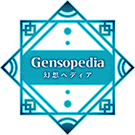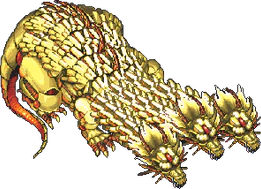The Golden Hydra (黄金竜, Ougonryū) is an enemy which appears in Suikoden. It is the final boss of the game, and the transformed form of Barbarosa Rugner.
It is advisable to take out the leftmost head first as it has the ability to revive the other heads once they are destroyed. Following that, take out the right head, which uses powerful magic against your party and then turn your attention to the center head. Be careful when attempting unite spells as together the three heads cover four elements, leaving many wide-ranged unite spells ineffective. Wind and Holy magic are the only elements that none of the heads are resilient to.
The right head boasts the highest STR in the game, with 520, and the left head holds the highest MAG in the game, with 420. All three heads boast high MAG stats, however so a player having trouble should consider leaving characters with low MAG stats behind. The right head also drops the most potch in the game, 200,000, not that the player can spend it after the battle.
Winning the battle is simply a matter of keeping the party's health topped up while focusing attacks on one head at a time, rather than trying to evenly wear down all three together. As soon as the first head falls, the pressure will alleviate, and the other two heads will prove easier to defeat in turn.
Information
In the final battle of the Gate Rune War, the Scarlet Moon Emperor Barbarosa, with the help of the Dragon King Sword, which had the Sovereign Rune embedded in its hilt, turned into a three headed Golden Hydra. Each of the heads held a fire, lightning and wind weakness, respectively, but also held resistances to many forms of magic.
It could best be described as a very powerful and formidable enemy, and very difficult to beat, even with the best selection of warriors in the Toran Liberation Army.
Data
| Stats
|
LV
75
|
HP
10000
|
STR
520
|
DEX
105
|
CON
55
|
SPD
75
|
MAG
370
|
LCK
80
|
| Elemental Resistances
|
Fire
Weak
|
Water
Resists
|
Earth
Normal
|
Lightning
Resists
|
Wind
Normal
|
Holy
Normal
|
| Location and Loot
|
| Area
|
Floating Garden
|
| Potch (Bribe)
|
200000 potch (Can't bribe)
|
| Items
|
This enemy does not drop any items.
|
| Stats
|
LV
75
|
HP
10000
|
STR
510
|
DEX
105
|
CON
55
|
SPD
75
|
MAG
380
|
LCK
80
|
| Elemental Resistances
|
Fire
Resists
|
Water
Normal
|
Earth
Resists
|
Lightning
Weak
|
Wind
Normal
|
Holy
Normal
|
| Location and Loot
|
| Area
|
Floating Garden
|
| Potch (Bribe)
|
0 potch (Can't bribe)
|
| Items
|
This enemy does not drop any items.
|
| Stats
|
LV
75
|
HP
10000
|
STR
490
|
DEX
105
|
CON
55
|
SPD
75
|
MAG
420
|
LCK
80
|
| Elemental Resistances
|
Fire
Normal
|
Water
Resists
|
Earth
Normal
|
Lightning
Resists
|
Wind
Weak
|
Holy
Normal
|
| Location and Loot
|
| Area
|
Floating Garden
|
| Potch (Bribe)
|
0 potch (Can't bribe)
|
| Items
|
This enemy does not drop any items.
|
Etymology
Gold refers to Barbarosa's title of the Golden Emperor. In Greek mythology, the Lernaean Hydra was a chthonic water beast that possessed many heads and for each head cut off it grew two more. It was killed by Heracles as part of his Twelve Labors.
Meanwhile, the use of りゅう as the word for dragon in the Golden Hydra's Japanese name seemingly reflects that the dragon is styled after Chinese rather than European dragons.
Trivia
- Even though it is the final boss, the heads of the Golden Hydra do not have the highest HP of all of Suikoden's enemies. The Shell Venus has even more HP (15,000).
- The Golden Hydra has the highest level and potch reward of any enemy in the game. However, after the battle the characters won't actually gain any level or potch.
- The right head is, with the exception of Neclord in his invincible form, the only enemy in the game that is invulnerable to the lightning element.
Other languages and releases
| Japanese kanji
|
黄金竜
|
| Japanese hiragana
|
おうごんりゅう
|
| Japanese rōmaji
|
Ougonryū
|
| Chinese simplified (HDR)
|
黄金龙
|
| Chinese traditional (HDR)
|
黃金龍
|
| Chinese pinyin
|
Huáng jīn lóng
|
| English
|
Golden Hydra
|
| French (HDR)
|
Hydre dorée
|
| German (HDR)
|
Goldene Hydra
|
| Italian (HDR)
|
Idra dorata
|
| Spanish (HDR)
|
Hidra Dorada
|
References

